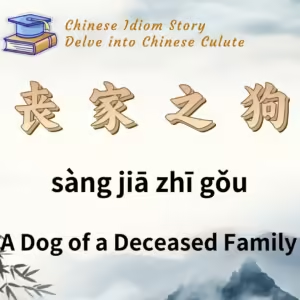
Chinese Idiom: 丧家之狗 (Sang Jia Zhi Gou)
English Translation: A Dog of a Deceased Family
pīn yīn: sàng jiā zhī gǒu
Idiom Meaning: Originally referred to someone who was eager to serve their master but was not utilized; it now often describes a person who has lost their owner, wandering aimlessly and without direction.
Historical Source: Records of the Grand Historian (《史记》) by Sima Qian, specifically from the chapter on Confucius.
Idiom Story:
Confucius, named Qiu and styled Zhongni, was a prominent figure in the Spring and Autumn period and the founder of Confucianism. Hailing from Zou (modern-day Qufu, Shandong), he was often referred to as “Confucius the Second” due to his position in the family lineage.
Despite his vast knowledge and ideals, Confucius struggled to gain recognition in his home state of Lu and decided to travel through various states with his disciples in search of opportunities. However, he often faced rejection and failure.
One day, while in the state of Zheng, Confucius became separated from his students and found himself alone at the eastern gate of the city. At that moment, a local man remarked to Zigong, one of Confucius’s disciples:
“There is someone at the eastern gate whose forehead resembles Yao’s, whose neck is like that of Gao Yao, and whose shoulders resemble those of Zichan. However, below the waist, he falls short by three inches compared to Yu, and he looks so thin and weak that he resembles a dog that has lost its owner.”
In this context:
- Yao: A legendary ancient emperor known for his virtuous rule.
- Gao Yao: A historical figure associated with law and order during the reign of Emperor Shun.
- Zichan: A respected politician from Zheng, contemporaneous with Confucius.
- Yu: The founder of the Xia Dynasty, celebrated for his ability and accomplishments.
When Zigong reported the man’s comments to Confucius, instead of being offended, Confucius laughed and remarked, “It doesn’t matter how a person looks. But saying I resemble a homeless dog—that’s true, indeed!”
This anecdote illustrates Confucius’s humility and ability to accept criticism, which ultimately led to the simplification of the phrase “累累若丧家之狗” to just “丧家之狗” or “丧家之犬,” emphasizing the image of being lost and directionless, akin to a dog without a master. The idiom serves as a metaphor for those who find themselves in difficult situations, lacking support or guidance.






